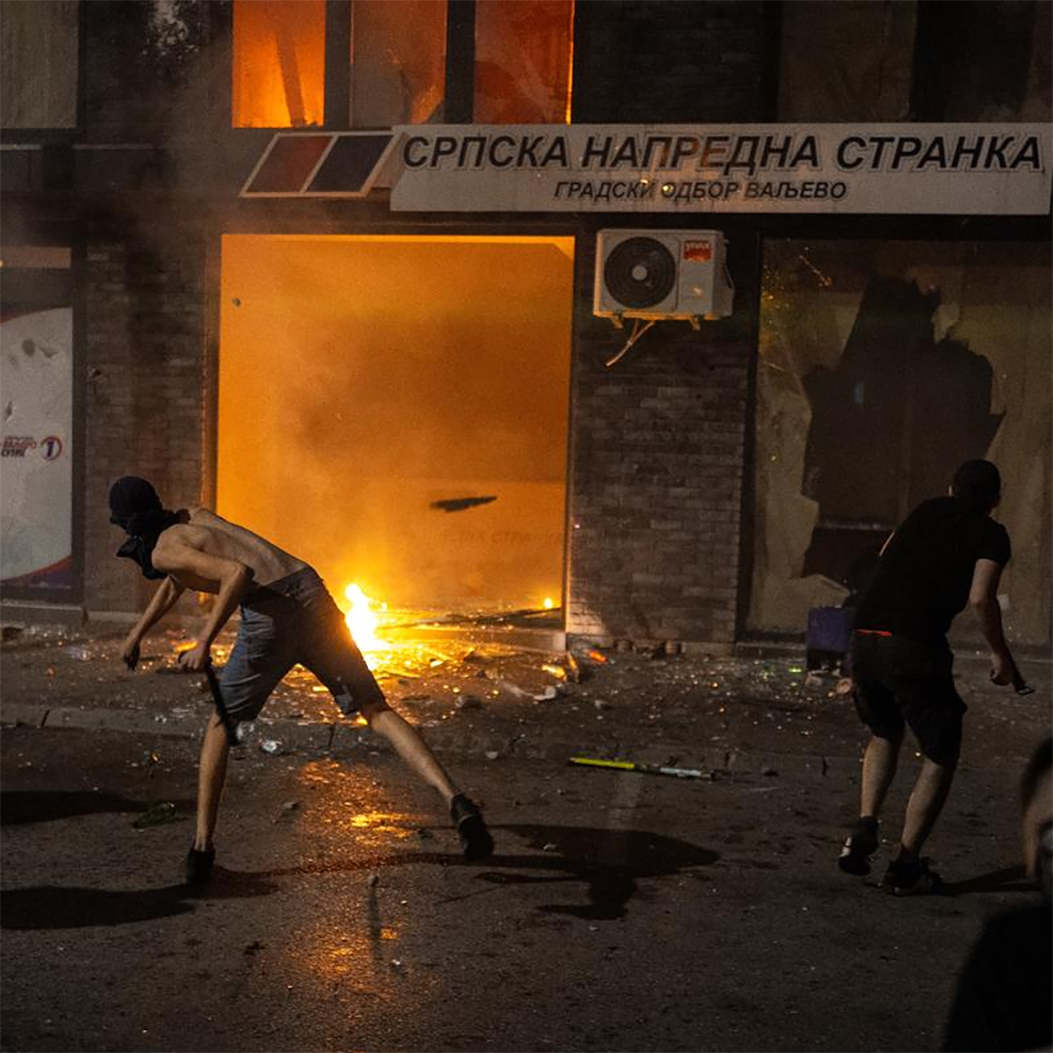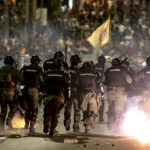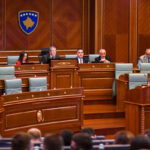- Dodik Lost the Mandate of President but Does Not Agree with This Decision
The Court of Bosnia and Herzegovina on 18 August rejected an appeal against the decision of the Central Election Commission concerning the termination of the mandate of the President of the Republika Srpska, Milorad Dodik.
The court decision is final and means that early presidential elections of the Republika Srpska must be announced within 90 days. The president, in this case, will be elected only for one year — until October 2026, when Dodik’s current mandate was due to expire.
In February, the court in Sarajevo convicted Dodik in absentia to one year in prison and banned him for six years from engaging in political activity. Dodik was found guilty of ignoring the decisions of the High Representative Christian Schmidt. At Dodik’s request, the court substituted the prison term with a fine, but the ban on holding office remains in force.
Dodik did not recognize the court decision. “I do not recognize the decisions of unconstitutional judicial bodies, I remain the President of the Republika Srpska!” he stressed at a press conference.
On the eve of the announcement of the court decision regarding Dodik’s mandate, the Prime Minister of the Republika Srpska, Radovan Višković, submitted his resignation. Dodik announced that he will propose the candidacy of the head of the government of the Republika Srpska after consultations in accordance with the procedure provided by the Constitution of the RS. According to him, the stage of culmination of the West’s hybrid war against the Republika Srpska has arrived, and therefore it is necessary to overcome the situation by assembling a national unity government.
In addition, Dodik announced the holding of a referendum at which “citizens will reject undemocratic decisions”. According to him, citizens will be able to answer the question whether they are ready for a “foreigner to impose his rules and destroy the constitutional order”.
The referendum is to take place at the end of September, after which the National Assembly of the Republika Srpska will “entrench the will of the citizens by legislative means”. If Sarajevo does not return to the Dayton principles even after that, then a referendum on the self-determination of the Republika Srpska will be held afterwards, Dodik said.
According to independent political analysts and legal experts, the announced referendum(s) will be annulled by the Constitutional Court of Bosnia and Herzegovina. If they are nevertheless held, they will take the form of a citizen poll, a plebiscite, and will have no legal consequences.
At the same time, according to Vehid Šehić, an expert in legal matters, it is very difficult to predict what will happen next “in a country like Bosnia and Herzegovina, a country where the rule of law still does not exist”.
- Anti-government Protests Continue in Serbia. The Main Demand — Early Elections
In Serbia protests demanding accountability for those responsible for the deaths of 16 people as a result of the collapse of the canopy at the Novi Sad railway station on 1 November last year have been going on for more than nine months.
Later, the students leading the protests added to the demands a call for the authorities to announce early parliamentary elections, because “the state has done nothing to hold those responsible for the accident to account”.
In August the protests in Serbia became more tense, clashes between anti-government demonstrators and supporters of the ruling Serbian Progressive Party, protesters and the police became more frequent, and police interventions became more intense. Since mid-August student and civic protests have been taking place every day and cover the largest cities across Serbia. Students are blocking faculties, citizens gather in front of court buildings, protest marches are held, pickets are organized in front of the offices of the ruling Serbian Progressive Party (SNS), and attacks on SNS headquarters are not rare.
Over the previous 15 days, student-civic protests took place en masse across the country, in which the police intervened, dispersing demonstrations by force using tear gas and flash-bang grenades, followed by arrests of participants in the protests, some of whom were brutally beaten.
As a result of clashes dozens of police officers and members of other security structures were injured, including the military special unit “Kobre”. Dozens of protesters were detained, and several demonstrators were arrested.
***
On 22 August the President of Serbia Aleksandar Vučić, demonstrating his intention to resolve the political crisis through negotiations, invited representatives of the protest movement to public debates.
“Despite all the bad things I think about their demands, I consider it very important that we hear them and listen to each other. I believe it is extremely important to restore dialogue in our Serbia,” Vučić said in a video address on Instagram.
“Let us enter into a dialogue, debates with those who think differently. They have the right to demand this from their president, including elections,” the President of Serbia said, inviting the “legitimate representatives” of the protesters “whom they will elect” to debates “on all our television channels and portals”. “It is time to show the face of each of us, but much more important is to show the programs and present a vision. I want us to fight for a vision, fight for the future, decide it through dialogue and conversation. Without conflict and violence. To return the country to its lawful state, to where it was nine months ago,” Vučić said.
“I want to enter into debates, and I want us to present our vision and our plans. This is the most important thing for Serbia at the moment, and then citizens will have the opportunity to see whose vision is real and realistic,” Vučić said in his address.
Representatives of the student protest movement and the opposition responded that debates will be possible only after early elections are announced.
Students of the Faculty of Philosophy of the University of Belgrade announced that they will talk to the president when he announces elections.
“Obviously he does not have an answer to the popular revolt, so now he would like to talk to us whom he for months called terrorists. We will discuss visions and programs for the future during the election campaign, when elections are announced,” said the students participating in the protests.
Students of the Faculty of Agriculture in Belgrade wrote: “Maybe, when elections are announced”.
The Faculty of Law in Niš stated: “Announce the elections. We have nothing more to talk about.”
“Students have voiced clear and concrete demands for months. While the state has for months responded only with beatings and open threats. During an election campaign there is room for debates. This awaits us after the announcement of elections,” students of the Faculty of Electronics in Niš said on 22 August.
The President of the opposition Democratic Party (DS), Srđan Milivojević, said that this was “Vučić’s call for a fake dialogue.” “You pretend to be strong when you arrest, threaten and beat, and when you see that no one fears you, you pretend to be a peacemaker,” Milivojević wrote on X.
Previously Vučić stated that parliamentary elections would be called early, but no exact date was announced. Obviously, further promises of the Serbian authorities without concrete decisions regarding the announcement of elections will not be understood by protest participants and opposition-minded citizens.
- International Reaction to the Political Crisis in Serbia
The reaction of the European Union to the events in Serbia remains restrained.
In mid-August, after the escalation of protests and outbreaks of violence, the European Commissioner for Enlargement, Marta Kos, expressed her deep concern.
“Reports of violence during recent protests in Serbia are deeply concerning. Advancing on the EU path requires citizens can express their views freely and journalists can report without intimidation or attacks,”Kos said on X.
On 19 August the EU Ambassador to Serbia Andreas von Beckerath met with the President of the National Assembly of Serbia Ana Brnabić to discuss, among other things, the situation surrounding the protests.
“The EU emphasized the need for all parties to uphold respect for fundamental rights, including the right to peaceful assembly,” reads the statement of the EU Delegation to Serbia after the meeting. The Ambassador condemned all acts of violence and hatred and called on political actors to avoid provocative rhetoric and the spread of disinformation.
Von Beckerath stressed that any suspicion of excessive use of force must be properly investigated. He also stressed the importance of protecting journalists and ensuring that police actions remain proportionate and compliant with human rights standards.
Dialogue across the entire political spectrum remains ‘the only way forward,” the ambassador said, calling on all sides to de-escalate tensions and pursue reforms through democratic channels.
Russia expressed its support for official Belgrade.
In a statement the Russian Ministry of Foreign Affairs described the protests as “a new wave of street riots that cross the bounds of civilized behavior”. The participants of the protests, according to the Russian foreign ministry, are “hooligans” who “do not shy away from open aggression, barbarism and violence”.
The statement says that “Russia cannot remain indifferent to what is happening in fraternal Serbia,” and expresses confidence that “peace and stability will be restored in this country and it will be able to cope with attempts to undermine the internal unity of the Serbian people, so necessary at the present historical juncture”.
- A Meeting between Vučić and Putin Is Being Prepared
On 22 August the President of Serbia Aleksandar Vučić met with the Ambassador of the Russian Federation in Belgrade Alexander Botsan-Kharchenko and discussed with him the possibility of negotiations between the countries “at the highest level”. “We discussed all the topics that are of interest to both countries, especially in light of the meeting at the highest level between the leadership of the two countries, which is to take place in the near future. I emphasized that we remain committed to developing friendly relations with Russia and are determined to preserve peace and political stability in the Western Balkans region, particularly in Bosnia and Herzegovina,” Vučić wrote on Instagram following the meeting.
It is expected that, in addition to the issue of the situation in BiH, the leaders of the two countries will discuss the signing of a new gas contract and the political situation in Serbia itself.
Vučić met with Putin on 9 May in Moscow. The trip of the Serbian president, the leader of a country that is a candidate for EU accession, provoked sharp criticism from Brussels, but no sanctions were imposed on Serbia or personally on Vučić by the EU.
- In Kosovo the leading party of Serbs was not allowed to participate in local elections
On 21 August the Central Election Commission of Kosovo did not register the leading party of Kosovo Serbs, the “Serbian List,” for participation in the local elections on 12 October.
Representatives of the “Self-Determination” Movement in the CEC opposed the registration, claiming that among the candidates from the “Serbian List” there are those who hold positions in the so-called parallel organs of Serbian power in Kosovo, and members of organizations that Pristina considers terrorist.
The “Serbian List” called the CEC decision illegal, discriminatory and anti-Serb.
The Head of the Office for Kosovo and Metohija of the Government of Serbia, Petar Petković, accused the CEC of making this decision “on the direct order” of the leader of the Movement “Self-Determination” and acting Prime Minister Albin Kurti and stated that “Kurti’s attack” on the “Serbian List” is “an attack on the entire Serbian people in Kosovo and Metohija”.
Criticism also comes from the international community.
Before the CEC vote the Chargé d’Affaires of the US Embassy in Prishtina, Anu Prattipati, met with Acting Prime Minister Albin Kurti and expressed concern on behalf of the United States. “We believe that all citizens of Kosovo should have the opportunity to elect their representatives at the local level,” Prattipati told journalists after the meeting.
The OSCE Mission in Kosovo expressed concern, stating that “the right to participate in free and fair elections is a cornerstone of democratic governance and an important element of inclusive political life”. “Exclusion of political actors undermines democratic pluralism, weakens trust in institutions and reduces opportunities for all communities to be fairly represented,” the mission added.
The “Serbian List” has already filed a complaint with the Election Complaints and Appeals Panel in Pristina and expects that the CEC decision will be revoked.
This is not the first time the CEC has refused the “Serbian List” registration for participation in elections. In December last year the Central Election Commission of Kosovo had already refused to register it for participation in the parliamentary elections in February 2025, but the party won an appeal in the Election Complaints and Appeals Panel and took part in the parliamentary elections.



